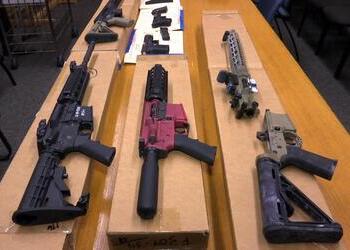Brazil Arms Traffickers Used Portable Technology to Manufacture Gun Parts
Brazilian authorities recently dismantled a criminal network trafficking weapons from the US to Brazil with a twist: The gang imported gun parts and then used a dedicated CNC mill to assemble the weapons on arrival.
After a two-year investigation into the network, Brazilian and American authorities raided facilities in Rio de Janeiro and Miami on March 15, seizing thousands of weapons, gun parts, ammunition and manufacturing equipment. The owner of a Brazilian steakhouse in Boston was also identified as having helped to launder and distribute the proceeds from this lucrative arms trade.
SEE ALSO: Florida's Gun Traffickers Supplying Brazil's Largest Gang
According to authorities, the gun parts were sent from Miami to various parts of Brazil by air and sea, hidden inside containers or packages among welding machines, printers or telephones. Once received in Brazil, the parts were transported to Vila Isabel, a neighborhood of Rio de Janeiro.
There, the gang used a Ghost Gunner, a portable CNC mill designed to make gun parts at home, to complete the weapons and assemble them. The guns were then reportedly used by drug traffickers, militia groups and hitmen, according to the Brazilian police's press release.
Curiously, one known name is among those under investigation. Ronnie Lessa, a retired military police officer who is in jail on suspicion of murdering human rights activist Marielle Franco in 2019, was named as a person of interest in the case.
Investigators have not revealed if Lessa was a client or a member of the network. However, in 2020 Brazilian newspaper O Globo that Lessa had previously bought weapon parts online and had them delivered to his daughter's home in Atlanta in the United States. She allegedly repackaged them and shipped them to Brazil for final assembly.
A 2019 raid on his home in Rio unearthed 117 disassembled M-16 rifles. Furthermore, Lessa's wife was arrested for arms trafficking in July 2021 after police discovered parts to assemble AR-15 rifles in a shipment destined for an address connected to the family.
InSight Crime Analysis
The use of a dedicated and portable CNC mill adds to technologies, such as 3D printers, which can be used to manufacture gun parts at home and which have become a nightmare for authorities.
The network in Rio de Janeiro used a Ghost Gunner, a portable CNC mill advertised as allowing customers with no prior experience to "manufacture unserialized rifles and pistols in the comfort and privacy of home." The machine takes blocks of metal such as aluminum and shapes them to make gun frames and receivers for weapons such as the AR-15 and AK-47.
SEE ALSO: Brazil's New Gun Laws Risk Raising Body Count
While the Ghost Gunner is not a 3D printer, it is part of a similar trend. Following this latest raid, Paulo Storani, a former captain of Brazil's Special Operations Battalion (Batalhão de Operações Policiais Especiais - BOPE), told O Globo about how criminal networks are making firearms made up of metal and plastic components. Metal parts such as the bolt or recoil spring are imported or smuggled more easily than an entire weapon, and 3D printers are used to print the final plastic components to produce fully functional firearms.
According to Storani, these firearms have a lifespan of one or two shots as the plastic is not durable enough to withstand further gunshots.
This epidemic of these "ghost guns" is affecting much of the region, with Mexican cartels among the criminal groups known to have used them. In February, US President Joe Biden announced a National Ghost Gun Enforcement Initiative to crack down on the problem. However, given the ease of disseminating manufacturing tips and the popularity of 3D printers, experts warn that the problem is set to get much worse.
And in Brazil, where the administration continues to loosen gun ownership laws, homemade weapons could mean real trouble. The country has seen a 65 percent increase in legal gun ownership since President Jair Bolsonaro was elected, with Brazilians now owning some 1.2 million registered firearms. But the actual number could be 10-15 times higher when weapons obtained on the black market are factored in, according to O Globo.
Was this content helpful?
We want to sustain Latin America’s largest organized crime database, but in order to do so, we need resources.
DONATE
What are your thoughts? Click here to send InSight Crime your comments.
We encourage readers to copy and distribute our work for non-commercial purposes, with attribution to InSight Crime in the byline and links to the original at both the top and bottom of the article. Check the Creative Commons website for more details of how to share our work, and please send us an email if you use an article.








Gloss